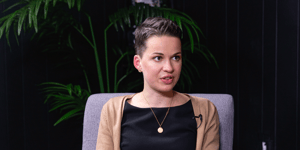Dr. Sofia Carozza joins Dr. Dan Kuebler to discuss neuroscience and the relationality of the brain. Dr. Carozza is a specialist in neuroscience and theology, with her thesis being written on abuse and neglect in child brain development. She concluded that in the interactional landscape of our brain, loving relationships form many of our structural functions.
Dan and Sofia discuss the basics of neuroscience, whether or not we have free will, neuroscience through a Christian lens, and the mysteries of the human brain.
What can Neuroscience Deliver?
Although Dr. Carozza recognizes that neuroscience has narrow limits, it can demonstrate how humans are ultimately relational creatures. Neuroscience answers questions about what the brain is doing on a biological level but cannot answer questions involving the meaning behind our reasoning processes.
Instead, neuroscience helps deliver a window into the reality of how our brain functions and how many of our choices are embodied in our flesh.
Neuroscience and Christian Anthropology
Dr. Carozza discusses her fascination with the creation narrative in Genesis, mainly how humans being made in the image and likeness of God reveals an outpouring of Trinitarian life. Meaning that to flourish as a human being involves embracing our relationships and interdependence upon each other. Dr. Carozza goes on to explain how relationships of love shape and nourish us on a deeply biological level.
The Mystery of Neuroscience
Although neuroscience can reveal a lot about the biological functions of the human brain, it ultimately shows us that the human person is still a mystery. There are virtually unlimited amounts of brain patterns that correlate to thoughts and behaviors. In fact, Dr. Carozza explains how there is no one-to-one correlation between brain activity and higher-level activity such as cognition and reasoning. There are many mysteries of neuroscience and the human person that are yet to be solved.
Take a Listen
This episode shows the reality that although our brain has many functions that can be studied through neuroscience, those functions always point to a more profound need for loving relationships. We are relational creatures with subjective experiences but are nonetheless united through a need for meaningful relationships. As such, we should examine the nature of relationships in our lives and ask if we are truly living a purposeful life.

